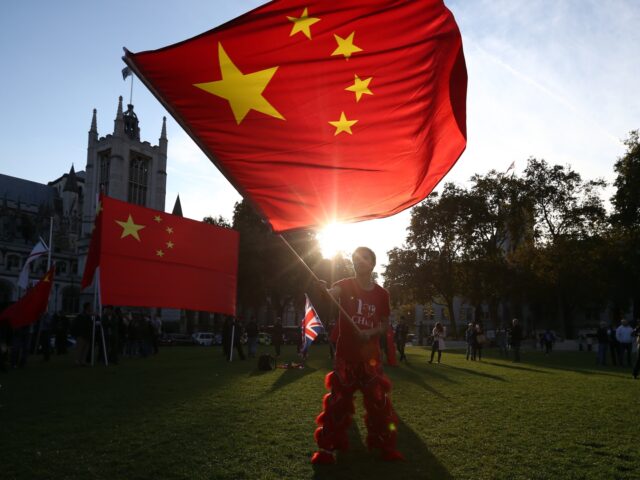Over eight in ten people in Britain are concerned over the growing influence of Communist China in the world and over half of the public believes that Beijing poses a “significant risk” to international peace.
According to a survey conducted by the Redfield & Wilton Strategies polling group found that 84 per cent of Britons surveyed are concerned about the rise and influence of China as a global power, while 57 per cent went on to say that they think that the communist country represents a “significant risk” to the peace and stability of the world.
The survey, conducted for the Daily Mail, went on to find that just 26 per cent of the public supported the current stance of the government towards China, compared to 14 per cent who were opposed, 33 per cent who were ambivalent and 26 per cent who said they were not sure.
In terms of personal responsibility, nearly half of those surveyed (49 per cent) said they do not usually consider whether a product is made in China prior to making a purchase. In contrast, some 38 per cent said that they did typically take into account if a product they wanted to buy was produced in the communist country, which is becoming increasingly known for its use of slave labour to drive down production costs.
Just 24 per cent said that they thought it would be easy or very easy for the average Briton to avoid Chinese-made products, while 67 per cent said that avoiding such products would be difficult or very difficult.
In the year up to last September, trade of goods and services between the UK and China totalled £103.5 billion, an increase of 9 per cent or £8.5 billion over the previous year, making the communist country Britain’s fourth-largest trading partner. As is typical for the so-called Middle Kingdom, trade with the UK was quite lopsided, with Britain exporting £31.7 billion in goods and services to China, compared to the UK taking in £71.8 billion from the Chinese.
In his first major policy declaration on relations with China in November, Prime Minister Rishi Sunak attempted to thread the needle by not outright declaring the nation a “systemic threat” as his predecessor Liz Truss wanted to do — prior to her unceremonious removal from office — and therefore leave the door open to continued trade with China while paying lip service to critics of the regime in Beijing.
“Let’s be clear, the so-called ‘golden era’ is over, along with the naïve idea that trade would lead to social and political reform. But nor should we rely on simplistic Cold War rhetoric. We recognise China poses a systemic challenge to our values and interests, a challenge that grows more acute as it moves towards even greater authoritarianism,” the PM said.
Prime Mister Sunak has long-faced criticism for his reported desire to deepen trade ties with China, going back to his days as Chancellor of the Exchequer under fellow Sinophile Boris Johnson. Sunak and his successor as top finance chief, Jeremy Hunt, have also both come under scrutiny for their personal ties to the communist nation.
Mr Hunt, who was instrumental in the globalist coup that dethroned Liz Truss and the installation of Sunak in Downing Street, is married to a literal Chinese propagandist, Lucia Guo, who was previously employed by the state-owned China International TV Corporation to present a documentary which hailed China’s draconian response to the Wuhan virus and glossed over the genocide of Uyghur Muslims and other ethnic minorities in the Xinjiang region.
Sunak, for his part, married into the tech royalty of India, wedding the daughter of InfoSys founder N.R. Narayana Murthy. The Indian tech giant still reportedly owns two Chinese subsidiaries, Infosys Technologies (China) Co Limited and Infosys Technologies (Shanghai) Co Limited, meaning that Sunak’s family could financially benefit from continued close trade relations between the UK and China.
Follow Kurt Zindulka on Twitter here @KurtZindulka

COMMENTS
Please let us know if you're having issues with commenting.